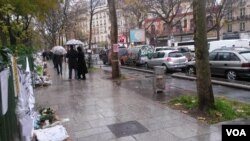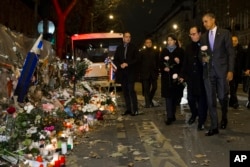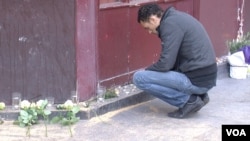Le Bistro des Oies is packed and noisy, with sounds of laughter mixing with strains of Neil Young’s Old Man.
Owner Stephane Dantier has little time to spare between serving platefuls of roast duck and chatting with clients.
It’s an ordinary week night — with a difference. Less than a block away, flowers and candles are still piled up in front of a restaurant and bar where terrorists gunned down more than a dozen people last month.
“Despite everything, people from the neighborhood kept coming here, although not the tourists we normally have,” says Dantier, who estimates business at his restaurant in northeastern Paris is only just beginning to pick up. “But not at night because there are too many memories of the attacks.”
As Paris marks a month since its second terrorist attacks this year, an uneasy sense of normality is settling in; but, in other ways, the November 13 assaults that killed 130 people and wounded more than 350 others have left an indelible mark.
It can be seen in the tough new security measures enshrined in France’s state of emergency, which has been extended for at least another three months, and in the surging popularity of the National Front party, which hopes to sustain its lead in the second round of regional elections on Sunday.
Memories of the attacks
The French capital still carries many memories of the attacks. Flags hang from apartment windows in a rare display of patriotism.
Tourists are fewer – the Bank of France estimates the attacks will cost the city roughly one quarter of its expected growth for the final three months of the year, or nearly $550 million.
At the Place de la Republique, not far from Dantier’s restaurant, Moroccan immigrant Aicha Soialah sweeps away floods of rainwater at a shrine for the victims.
“I take the Metro here, 11 or 12 stops to clean this place almost every day,” says Soialah. “France gave me a sense of worth — now I’m giving it back.”
Down the street, police barriers have finally been removed around the Bataclan music hall, where Islamists killed 90 people. American rock band Eagles of Death Metal, which survived the assault, returned to the city Monday to perform with the band U2.
Bar recently reopens
A few blocks away, 24-year-old Matthieu Gacon is enjoying a Desperados (beer) with friends at La Bonne Biere, a bar targeted in the attacks but which recently reopened.
“We came here as a gesture to help the bar, and to say ‘yes’ to French liberties and values,” Gacon says. “But it feels strange to be here.”
The fallout from the attacks is registering at the ballot box as well. The anti-immigrant, law and order National Front party secured a commanding lead in the first round of regional elections last week, although the latest polls show it may not be able to sustain the lead in Sunday’s second round.
With the ruling Socialists struggling to turn around the economy and grow jobs, the Front is getting particularly strong support from young voters like 21-year-old Vincent Collo, who joined the party three years ago.
“I began supporting the party when I saw the situation in my country getting increasingly worse,” Collo says at a recent party rally in Paris. “We have massive immigration and the government can’t control our borders. It’s incapable of controlling radical Islam, so we get these attacks. The National Front was the first to see this and to offer solutions.”
Others, however, say they are appalled by the Front’s strong showing. “I have this feeling that everything is going totally crazy,” says 28-year-old Alban ElKaim. “They can’t be a part of the solution; they are the problem.”
There are other concerns about the direction in which France is going.
Under the country’s state of emergency, police have closed questionable mosques, seized Jhadist propaganda and detained people suspected of aiding the attackers; but, they have also arrested scores of climate protesters for violating a ban against demonstrations.
Muslim activists and rights groups say they are also worried some French Muslims may be unfairly targeted.
Emergency measures
The government is now considering extending the emergency measures yet again and writing them into the French constitution.
"We understand that in this very specific, exceptional context, such measures can be put into place for a very specific duration of time," said Nicolas Krameyer, head of Amnesty International France's free expression program. "Our main concern is that the state of emergency and some of the exceptions to the state of law become permanent."
On Sunday, restaurant owner Dantier and other neighborhood residents will gather over hot chocolate and coffee. They’re planning to string up colorful, Tibetan-style flags.
“We’re putting some color in the sky so people stop hanging their heads,” Dantier said, adding, “It’s not really a tribute to the dead. It’s because we have to keep on living.”













